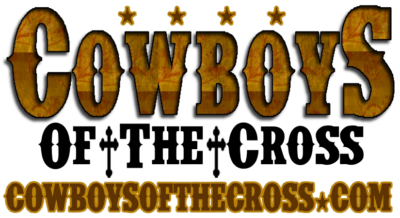
by admin | Jun 1, 2022 | Behind the Bucking Chutes, The Company You Keep
Part 4 of 7 The Company You Keep
By Scott Hilgendorff / Cowboys of the Cross
Not only are we not meant to be a part of the world, the Bible shows us that through a saving faith in Jesus, we actually are meant for something so much more. Finding salvation through a saving faith in Jesus automatically separates us from the world.
2 Corinthians 5:17 Therefore if anyone is in Christ, he is a new creature; the old things passed away; behold, new things have come.
Paul is making it clear in his letter to the church at Corinth that we are made completely new through our salvation given to us through our belief in Christ and the punishment he took that was meant for our sins. When we believe this, repent of our sin and ask to be forgiven, we’re made completely new before God who no longer see us for our sin. As new creatures, we begin the process of becoming more like Jesus, called sanctification, while God already sees us as forgiven and perfect, able to be in His presence when we die.
But while we’re here, we pursue the teachings from the Bible out of a desire to be closer to God and become more like Jesus. Through knowledge of scripture and letting that change us, we begin to become more like Jesus while fighting against the temptations of this world that would distract us and pull our attention away from God, His word and His commands for us.
But if we think about who we are in Jesus and how separate we are from this culture, it can help us to resist that temptation.
1 Peter 2:9 But you are a chosen race, a royal priesthood, a holy nation, a people for his own possession, that you may proclaim the excellencies of him who called you out of darkness into his marvelous light.
If we’re something special to God, so special that we’re seen as part of a ‘royal priesthood’ and a ‘holy nation’ that God wants us for Himself, how can we not want to pursue becoming more like Jesus and less like the world around us?
That doesn’t make us better than everyone else, just set apart. We should never look down on those who haven’t found a saving faith in Jesus. Instead, as Peter tells us, we would want to tell the world around us so they also could be pulled out of the darkness Peter describes.
Temptation is strong, especially in the rodeo culture. Not only do we have to contend with the traditional world around us we deal with as we work, run errands or attend events with family that believe differently than us, but in rodeo, we have whole separate culture that tempts us through the pursuit of winning and through the sinful side of the industry that pushes a lifestyle of partying.
We have to live within this world, but as Peter stresses, we have to remember that we’re not part of that world anymore.

by admin | May 19, 2022 | The Company You Keep
Part 3 of 7 The Company You Keep
By Scott Hilgendorff / Cowboys of the Cross
From teachings from Jesus, Paul and Peter to how God instructed the Israelites to remain separate from the other cultures around them, the Bible shows us in many ways that we are not meant to be a part of the world and culture around us.
The Israelites were commanded to completely destroy entire nations and when they failed to do so, they experienced the consequences of it.
Judges 2:1-3 The angel of the Lord … said, “I brought you up out of Egypt and led you into the land I swore to give to your ancestors. I said, ‘I will never break my covenant with you, 2 and you shall not make a covenant with the people of this land, but you shall break down their altars.’ Yet you have disobeyed me. Why have you done this? 3 … they will become traps for you, and their gods will become snares to you.’”
By allowing some of the nations to survive, the Israelites were eventually influenced by their false gods and beliefs, leading them to stray from following God and eventually to God temporarily taking the Promised Land away from them and exiling them for 70 years to Babylon. God wasn’t fooling around when He said He wants all of our attention.
1 John 2:15-17 Do not love the world or anything in the world. If anyone loves the world, love for the Father is not in them. For everything in the world — the lust of the flesh, the lust of the eyes, and the pride of life — comes not from the Father but from the world. The world and its desires pass away, but whoever does the will of God lives forever”
Worldly things can be just about anything from money and sex to filling a tack room with more equipment than we’ll ever be able to use. All of it is temporary. Instead, John is reminding us that we need to pursue God, who, through the sacrifice of Jesus on the cross, made a way for all of us to be able to repent and be forgiven of our sin so that through belief in Jesus, we could have an eternity in Heaven. Pursuing our own desires based on what the culture around us tells us we need or wants, takes our attention away from God.
One of the main reasons we stay apart from the world is so that our focus is on God.
Psalm 1:1-2 Blessed is the man who walks not in the counsel of the wicked, nor stands in the way of sinners, nor sits in the seat of scoffers; but his delight is in the law of the LORD, and on his law he meditates day and night.
In the Psalm, we’re being told the person who follows God and not the non-believers around him is going to be the person who is better off and stresses the daily commitment we’re to put into following God. The Bible is full of teaching that points us toward obedience to God but the selfishness of the world around us can tempt us away from that.
We can be fully engaged in our rodeo sports while not being engaged with those who tempt us to sin. That can be as simple as not going to the bar after a show to as complicated as having to remove some people from our lives because they pull too hard on us to ignore our faith.

by admin | May 4, 2022 | The Company You Keep
Part 2 of 7 The Company You Keep
By Scott Hilgendorff / Cowboys of the Cross
“If you want to be successful, surround yourself with successful people.”
Quotes like this are common among the rodeo crowd and they are embraced by competitors because of that desire to succeed and get ahead.
It makes sense.
If you spend more time with competitors who are better than you, you might learn something from their attitude, skills or way of living that helps you to also succeed or become a better bull rider, barrel racer, roper or horseman.
It’s like this in Proverbs 27:17 Iron sharpens iron, and one man sharpens another.
This is a common verse many people can quote and often not realize that it even comes from Scripture. It’s point is simple: we can help make each other more effective.
But when it’s coming from the Bible we understand it’s referring to Christians. Another Christian friend can help me be more effective in my faith and I can help him to be more effective tool.
Conversations about the Bible and living out our faith with each other help us to be ‘sharper’ believers.
And we’re encouraged throughout Scripture to spend time together as believers from when the church first started in the historical account we seen in Acts to to the letters Paul writes to different churches as he tries to encourage them or confront conflicts he has learned about within their communities.
Hebrews 10 24-25 And let us consider how we may spur one another on toward love and good deeds, 25 not giving up meeting together, as some are in the habit of doing, but encouraging one another—and all the more as you see the Day approaching.
Paul is telling church they need to encourage one another to show love and do good and to encourage one another as if we are near the very end. If we knew for sure these were the last days before Jesus came back, we would be rushing to make sure others knew who Jesus was. Paul is telling the people in the church to encourage each other and live as if that day was almost here.
Again, what we’re seeing is a push toward working together to do a better at living our our faith.
He tells the church at Colossae that we are to work together as well.
Colossians 3:16 Let the word of Christ dwell in you richly, teaching and admonishing one another in all wisdom, singing psalms and hymns and spiritual songs, with thankfulness in your hearts to God.
We’re to teach and correct each other while worshiping God together so that the teachings of Jesus would become a big part of who we are.
Just like the Bible warns us not to be unequally yoked with unbelievers who will wear us down and weaken our faith, we see that by being connected together with believers, our faith will be strengthened and better equipped to share that faith with others.
We seem to understand this idea outside of the Bible when it comes to wanting to be better competitors and seeking personal success. We don’t realize or overlook how much a similar teaching is is commanded through Scripture to be connected to other believers with the focus being on our becoming stronger in our faith and able to lead others to Jesus.

by admin | Apr 18, 2022 | The Company You Keep
Part 1 of 7 The Company You Keep
By Scott Hilgendorff / Cowboys of the Cross
Working in rodeo, when cowboys or bull riders share advice, it’s often focused on how to be more successful at the sport. A common piece of advice I’ve seen shared among the cowboy crowd is about just that—the crowd you’re in. They advise to spend more time with better, more successful competitors otherwise you risk being brought down by others.
The Bible has something to say about that as well when it comes to growing in our faith.
2 Corinthians 6:14 Do not be unequally yoked with unbelievers. For what partnership has righteousness with lawlessness? Or what fellowship has light with darkness?
Despite being written about 2,000 years ago, this is an illustration that should be easy to understand for cowboys, whether on the rodeo or ranch side of the industries.
What happens when an ox or team of horses is yoked together but one is not as well equipped, well trained or strong as the other?
The team can’t work as a team. The stronger horse is having to pull harder. The horse working harder is going to wear down. The horse working harder is going to be held back.
Sure, there are always exceptions, but when it comes to dating, it is common to hear a Christian think he or she can maintain a healthy relationship with a non-believer. The Christian thinks he or she will win that person over to Christ and will justify staying in the relationship. He or she might even get the person to study the Bible with them a little and at the start, will get asked lots of questions. That will encourage the Christian to push harder, even seeing it as ministry or what God would have them do.
The intentions are good for sure.
As the relationship heats up, the Christian compromises and moves in. I mean, even more time together means an even bigger chance to win the person over for Jesus, right?
But after that initial bit of interest, what typically happens is, the non-believer begins to fight against the changes the Christian hopes to bring about. As they begin living more daily life together, the Christian ends up sleeping in Sunday mornings with the non-believer because it’s easier than fighting to get the other to go to church. The Bible study stops as they get busier living life but soon the Christian wears down and instead of the non-believer digging into a Bible he or she never had any interest in, the Christian begins reading his or her Bible less, praying less, spending less time thinking about life from a Christian perspective as they become a couple.
The Christian wears down and is no longer the force for Jesus that he or she was. His or her light dims.
Being unequally rarely works and the ox will sooner or later stumble and fall and be taken down by the weaker ox.

by admin | Apr 5, 2022 | Behind the Bucking Chutes
By Scott Hilgendorff / Cowboys of the Cross
Be Strong.
Weakness is not having the strength to do something. Meekness is having the strength and power but holding it back. Do not confuse meekness for weakness.
We all have power over someone. A parent has power over a child, a trainer in the arena with a whip has power over a horse, a rodeo judge has power over the contestant.
Matthew 5:5 Blessed are the meek, for they shall inherit the earth
Sounds like Jesus is telling us there’s a lot to be gained by holding back, even when it feels justified.
If we have strength over others, we can abuse that strength by taking more, living excessively, intimidating others or being abusive while putting our needs above others. Strength can lead to selfishness when it isn’t controlled.
The ideas Jesus was sharing in his Sermon on the Mount are challenging to the cowboy community. We’ve looked at how Jesus tells us to turn the other cheek to stop us from pursuing vengeance and giving us an opportunity instead to show others the power of forgiveness. That can become an illustration that can lead others to wanting to know about why we walked away from a situation and lead to a discussion about our saving faith in Jesus.
That’s why it is important to understand that choosing to turn the other cheek can be a sign of meekness that has absolutely nothing to do with being weak.
A person of great strength has the power to intimidate or abuse others but think about how much better a leader is if, instead of abusing that power, they treat someone with kindness and gentleness. By keeping strength under control, well, that takes even more strength than lashing out.
John 18:10-11 Then Simon Peter, who had a sword, drew it and struck the high priest’s servant, cutting off his right ear. (The servant’s name was Malchus.)
11 Jesus commanded Peter, “Put your sword away! Shall I not drink the cup the Father has given me?”
Peter lashed out when guards came to take Jesus away and Jesus commands Peter to put the sword away. While we know God’s plan for salvation was meant to unfold and Jesus would soon die for us on the Cross, Peter didn’t and his rash response, strength over that priest, would potentially have interfered with the need for Jesus to be arrested, tried and sacrificed for us on the cross.
Our self-control, or meekness, can set an example people are not expecting the way our culture normally handles situations and can lead to important discussions about salvation by showing a Christ-like response to others. That offers a great inheritance of eternal life in Heaven to others.
Does it bring God glory to use your power to lash out or does it bring Him glory for others to know you could have made hamburger out of a guy’s face, that he had it coming, but you held back your anger and spared him. That shows Jesus to the guy and opens the door to talk about salvation. THAT is something we’re all commanded to do but few of us ever do.
It can be hard for a cowboy, bull rider or outlaw to accept this but again, meekness is having real power but keeping it under control. Holding back takes more strength than letting loose. Be strong.






Recent Comments